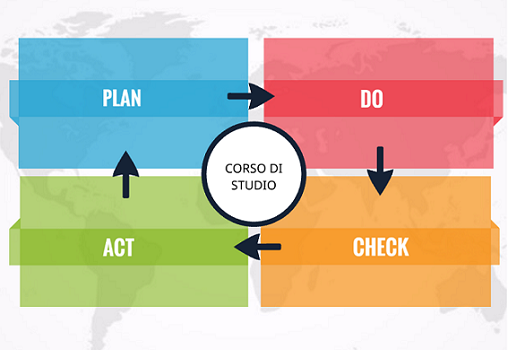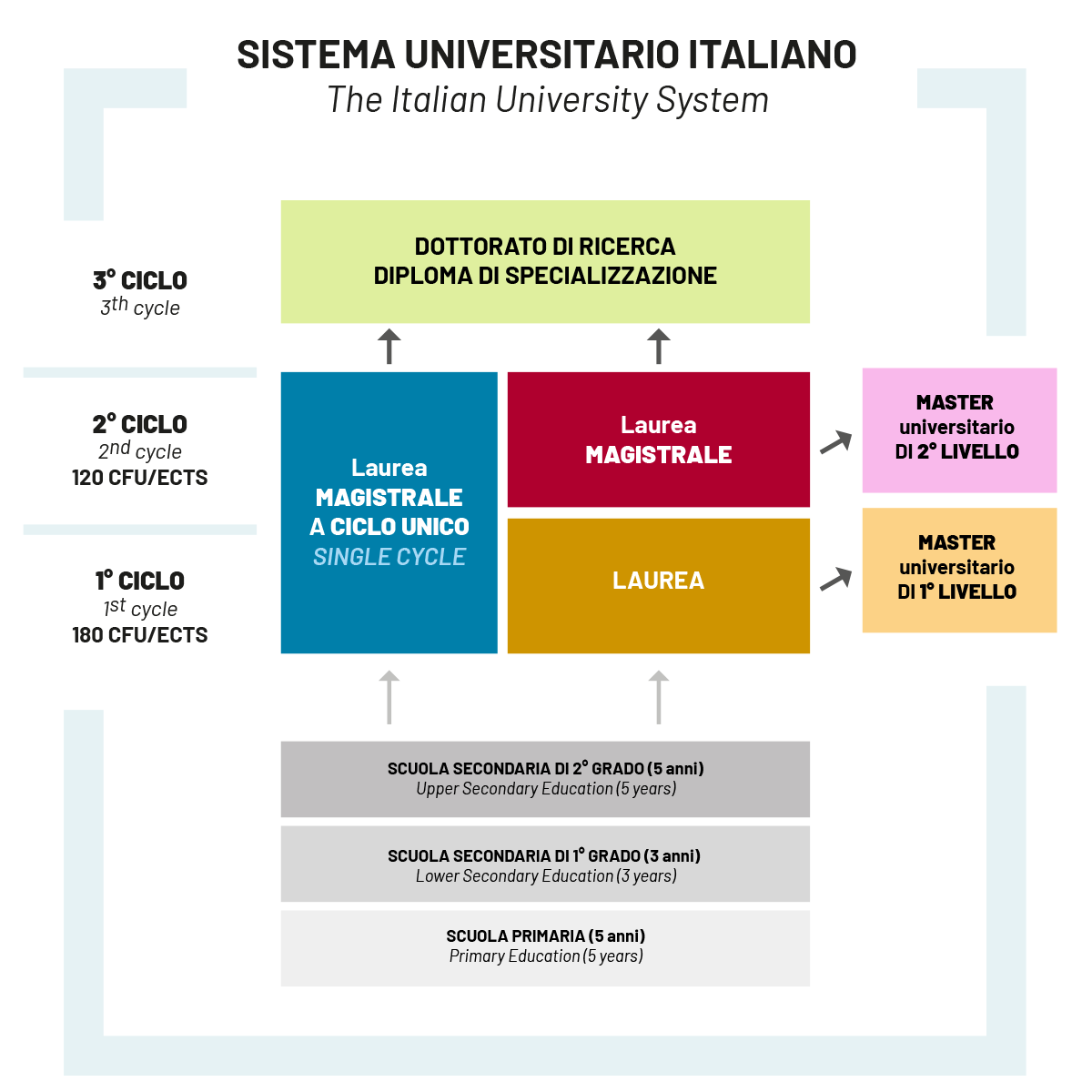The programme
Here you can find an overview of the degree programme, including information on its organisation and regulations, as well as a number of useful information. In addition, this section includes an overview of the University’s Quality Assurance system and the Student Orientation services available to prospective students, to help them choose the right course for them.
Student orientation services
The new website of the Student Orientation Office, with new form and content, is the result of a long process aimed at providing a better and more comprehensive service to its many users. Users are mostly secondary school pupils approaching the University for the first time, and schools' University Orientation Services which organise activities to assist their pupils in post-school choices. Making a decision means choosing the best alternative to satisfy one's expectations, preferences and aspirations.
More details: www.univr.it/orientamento (italian page)
Email servizio.orientamento@ateneo.univr.it
Telephone number 0458028000
Timetable
Sportello telefonico: dal lunedì al venerdì, dalle ore 9:00 alle 13:00.
Find out moreCourse of study in brief
Degree programme annual factsheet (SUA-CdS)
As part of the Quality Assurance system, complete, updated and easily available information on objectives, study plan, resources used and results achieved for each degree programme is made available through the SUA-CdS - Scheda Unica Annuale del Corso di Studio (Degree programme annual factsheet). This includes an Overview and three public sections (Learning Objectives, Student Experience, Learning Outcomes) which together provide a wide range of information about each degree programme. The SUA-CdS also contains an administrative section (Administration and Quality Management) that is for internal use only.
The Degree programme annual factsheet (SUA-CdS), which is currently available only in Italian, is a valuable tool that can be used by the University to design, implement and reorganise, as well as to evaluate, each degree programme. However, the SUA-CdS factsheet is also useful for students, to help them choose the right programme of study.
Il CdS si propone, poi, di far acquisire una formazione avanzata nel campo delle discipline storico artistiche, con attenzione ai diversi ambiti delle arti visive (pittura, scultura, architettura, arti decorative e suntuarie), ma anche della musica e dello spettacolo, dal Medioevo al periodo contemporaneo. Obiettivo primario sarà quello di fornire delle solide basi metodologiche e una piena consapevolezza delle coordinate storico-critiche, dando attenzione privilegiata alla considerazione delle opere in sé e nel loro contesto spaziale, storico e culturale. Il percorso formativo consentirà altresì di favorire un approccio interdisciplinare allo studio, con particolare attenzione alle discipline storiche e dello spettacolo.
La conoscenza diretta delle opere e l'acquisizione delle metodologie di ricerca saranno facilitate da visite ai complessi monumentali del territorio, nonché da viaggi di studio a musei e monumenti italiani e stranieri. Saranno, inoltre, eventualmente organizzati stage e tirocini presso laboratori e in luoghi di interesse artistico, anche in collaborazione con altre Università, Enti e Soprintendenze, sia in Italia, sia all'estero. Lo studente avrà la possibilità di svolgere una parte del curriculum degli studi in Università di altri paesi della UE, grazie agli scambi Erasmus.
Questa impostazione del CdS coinvolge, di fatto, due aree di apprendimento, accomunate dall'obiettivo di rafforzare le capacità di pensare, progettare e operare, tenendo costantemente presenti la circolarità del rapporto tra sapere teorico ed esperienza pratica. La prima area mira a consolidare e ampliare la formazione di base di carattere storico e metodologico, finalizzandola alla ricerca, alla comprensione e all'interpretazione dei fenomeni culturali in una logica interdisciplinare. La seconda area di apprendimento riguarda più strettamente l'ambito storico artistico e mira a offrire una formazione avanzata relativamente ai contenuti, alle metodologie e alle tecniche dei beni culturali, dal Medioevo al presente, fornendo conoscenze teoriche e applicate sui problemi della conservazione, gestione e valorizzazione del patrimonio storico-artistico e delle sue istituzioni.
Governing bodies
Quality Assurance
The quality of a degree programme is the extent to which it achieves its educational objectives and meets the quality requirements of the educational activities offered, which are determined in line with the needs and expectations of students and representatives of the world of work.
- periodic consultations with representatives of the world of work to assess the adequacy of the cultural and professional profiles offered in their courses;
- design of educational contents and planning of resources;
- organisation of educational activities and teaching services;
- monitoring the effectiveness of teaching and planning measures to improve teaching and services;
- provision of complete and up-to-date information on its website, relating to the programme (professional roles, expected learning outcomes, learning activities).

In a Quality Assurance system, students play a fundamental role: each student can play their part by participating in the Quality Assurance groups of their degree programme and in the Faculty-Student Joint Committees or, more simply, by taking part in the Student Survey on teaching, or questionnaires. It’s in this context that specific workshops for student representatives (‘Laboratori di rappresentanza attiva’) are periodically made available to students by the University and the University’s Quality Assurance Board. To find out more, please see the relevant section.
Il sistema di valutazione universitario e il ruolo dello studente
by Prof. Graziano Pravadelli: a lecture recorded on the occasion of the January 2021 workshop for student representatives.
QA bodies
QA in degree programmes
QA activities
Degree Programme description and regulations
Not yet available
The Degree programme teaching regulations, published on june/july set out the organisational aspects of the degree programme, in line with the University’s teaching regulations. It includes general information about the programme, links to the relevant module web pages and specifies the administrative aspects.
Other Rules
The Italian University system

First-cycle degrees: Bachelor’s degree programme
First-cycle degrees are aimed at enabling students to achieve a command of general scientific methods and content, and to acquire specific professional knowledge.Admission requirements: secondary school diploma after completing 13 years of study in total and passing the relevant State examination, or equivalent foreign qualification; admission may be subject to further assessment.
Duration: three years.
Graduation: in order to obtain the degree, it is necessary to gain at least 180 CFU; doing an internship and preparing a dissertation/thesis may also be required. Upon completion of a Bachelor’s degree, graduates may continue their studies by enrolling in a Master’s degree or other second-cycle degree programmes and courses.
Academic title: upon completion of a Bachelor’s degree (Laurea), graduates are awarded the title of “Dottore”.
Second-cycle degrees: Master’s degree
Second-cycle degrees aim to provide students with an advanced training and knowledge to take on highly-skilled roles.Admission requirements: applicants must hold a Bachelor’s degree, or a foreign equivalent qualification; curricular admission requirements for each course may vary depending on each University.
Duration: two years.
Graduation: in order to obtain the degree, it is necessary to gain at least 120 CFU, as well as preparing and presenting a dissertation/thesis.
Academic title: upon completion of a Master’s degree (Laurea Magistrale), graduates are awarded the title of “Dottore magistrale”. Single cycle/Combined Bachelor+Master’s degrees
Some courses (Medicine and Surgery, Veterinary Medicine, Dentistry and Dental Prosthetics, Pharmacy and Industrial Pharmacy, Architecture and Building Engineering-Architecture, Law, Primary Education) are offered as Single cycle/Combined Bachelor+Master’s degrees (Corsi di Laurea Magistrale a Ciclo Unico).
Admission requirements: applicants must hold a secondary school diploma or equivalent foreign qualification; admission is subject to passing an admission test.
Duration: five years (six years and 360 CFU for Medicine and Surgery, and Dentistry and Dental Prosthetics).
Graduation: in order to obtain the degree, it is necessary to gain at least 300 CFU, as well as preparing and presenting a dissertation/thesis. Upon completion of a Single-cycle degree, graduates may continue their studies by applying for a PhD programme (Dottorato di Ricerca) or other third-cycle courses.
Academic title: upon completion of a Master’s degree (Laurea Magistrale), graduates are awarded the title of “Dottore magistrale”.
Third-cycle degrees
PhD programmes: these courses enable students to gain reliable methodologies for advanced scientific research through innovative methodologies and new technologies, and generally include internships abroad and lab activities at research laboratories. Graduates wishing to apply for a PhD programme must have a Master’s degree (or a foreign equivalent qualification) and pass an open competition; PhD programmes have a minimum duration of three years. In order to complete the programme, students must produce a research thesis/dissertation and present it at a final examination.Academic title: upon completion of a PhD programme, students are awarded the title of “Dottore di ricerca”, or “PhD”.
Postgraduate specialisation courses: these are third-cycle courses aimed at enabling students to develop advanced knowledge and highly-specialised skills, such as in the medical, clinical and surgical fields. To be admitted to these courses, applicants must have a Master’s degree (or a foreign equivalent qualification) and pass an open competition. Postgraduate specialisation courses may last from two (120 CFU) to 6 years (360 CFU) depending on the type. Academic title: upon completion of this programme, graduates are awarded a “Diploma di Specializzazione”.
Professional Master’s programme
1st-level Professional Master’s programmes: these courses enable students to further enhance their scientific knowledge and professional skills. In order to apply, applicants must have a Bachelor’s degree, or foreign equivalent qualification. The minimum duration is one year (60 CFU). Please note that completing this course will not provide you with direct access to a PhD programme (Dottorato di Ricerca), or other third-cycle courses, as these courses are run and managed by each University at the local level. Upon completion of this programme, students are awarded a “Master universitario di primo livello”.2nd-level Professional Master’s programmes: these courses enable students to further enhance their scientific knowledge and professional skills. In order to apply, applicants must have a Master’s degree, or foreign equivalent qualification. The minimum duration is one year (60 CFU). Please note that completing this course will not provide you with direct access to a PhD programme (Dottorato di Ricerca), or other third-cycle courses, as these courses are run and managed by each University at the local level. Upon completion of this programme, students are awarded a “Master universitario di secondo livello”.
Other useful things
Crediti Formativi Universitari (CFU/ECTS credits): Italian university courses are based on the CFU system. 1 CFU is equal to 25 hours of study. The average annual academic workload for a full-time student is generally assumed to be 60 CFU. CFU and ECTS credits serve the same purpose and generally have the same value.Degree class: Bachelor's and Master's degree programmes that have the same learning objectives and activities are grouped into “degree classes". The educational content of each programme is set autonomously by each university; however, universities are required to include certain educational activities (and the corresponding number of CFU credits) set at the national level. These requirements are established in relation to each degree class. Degrees in the same class have the same legal value.
Double/Joint degrees: the Italian universities may establish degree programmes in partnership with other Italian or foreign universities. Upon completion of these courses, graduates are awarded a joint or double/multiple degree, one from each Partner University.

